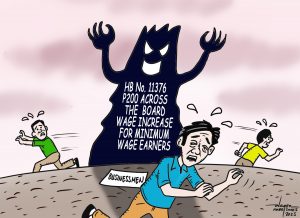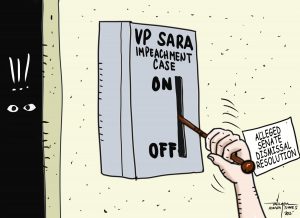We welcome the plan to implement the Davao City High Priority Bus System (DCHPBS). Not only that this will ease the city’s now burgeoning vehicular traffic situation, it will also improve the present chaotic scenes of Davao’s major roads leading to the urban center.
But of course we commiserate with the thousands of public utility drivers who are to be affected when the one thousand or so units of passenger buses under the DCHPBS will be fielded. These buses will definitely ease out the PUJs from their current routes. And considering there are roughly 7,000 drivers alternating in driving the current number of PUJs then the most that can be accommodated to drive the buses of the DCHPBS is 2,000 drivers assuming that those from the PUJ ranks are hired and assigned on alternate basis.
At this point though, we believe that the city government will be doing good service to the Davaoenos if it can already start clarifying how the DCHPBS operates.
What is its legal personality considering that its implementation is to be funded by government money?
Will the DCHPBS be a city-owned and controlled corporation like the Davao City Water District (DCWD)? We assume that it will be such. Therefore, there will be a governing body to run the transport business of the city and a management team to undertake its day-to-day operation.
Another issue that might as well be settled at this point in time if the DCHPBS evolves into a city-owned and controlled corporation is the matter of the drivers’ and conductors’ (if there will be) status.Will they be salaried employees of the DCHPBS, or will they be like their present status – on boundary or commission scheme?
Or will the DCHPBS be operated like the city’s many public markets and be made just a component of the local government’s Enterprise Department?
Considering the participation of the Asian Development Bank (ADB) in the preparation of the project design then there is high degree of assurance that the DCHPBS will succeed. The only remaining area where serious doubts can be raised, is how effective would be the city’s support plan for PUJ drivers who would not be accommodated by the DCHPBS operation.
The head of the City Transport and Traffic Management Office (CTTMO) Retired Police Colonel DionisioAbude in a press forum, said the displaced drivers will be given by the city financial assistance amounting to between P60,000 to P80 thousand. This is in addition to the livelihood skills training that will be provided by the Technical Education Skills Development Authority(TESDA).
To those drivers who totally depend on their income to support the daily needs of their families the planned assistance may be chilling. What business or livelihood enterprise capitalized at P60 to P80 thousand would derive a profit enough to feed a family of, say four or five? And this situation will have to go on until the driver head of the family will complete his technical-vocational skills training with TESDA lasting on the average of six (6) months! And there is no certainty that the driver will immediately get hired upon his completion of the skills training!
Meanwhile, the expenses for the driver’s family’s survival and his transportation expenses while undergoing training for new skills continue eating on the financial assistance.
Therefore, the possibility is that without additional support from the city government, or from relatives of the affected driver, half way through his training duration the cash assistance given by the local government is already gone.
We believe that it is on this aspect of the project design that the city government economic team must review thoroughly. They must check whether the basis of the ADB-initiated design can be applied to the condition prevailing in the city’s existing privately operated transport industry where drivers, conductors, and even mechanics are bondage to the daily boundary and/or commission system.
Yes, to us, the DCHPBS may be the right vehicle to modify the present compensation scheme of transport workers especially drivers, conductors and related workers.
If the DCHPBS is to be a city-owned and controlled corporation like the DCWD then make every employee work on salary basis. If it becomes a unit of the local government’s enterprise unit then do exactly the same – make the workers salaried employees.
As to the displaced drivers let the proposed amount be reviewed to make sure that the final assistance figure can tie the driver’s family over until he finds a new job using his TESDA-given skill.
Rough Cuts: A novel project that needs some review
More from OPINIONMore posts in OPINION »



